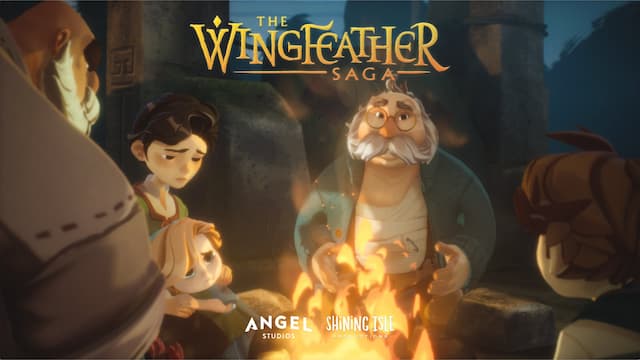Explaining The Chosen: Season 1, Episode 5: The Wedding Gift

This post contains affiliate links. I only advertise items I personally recommend and may receive a small commission from qualifying purchases. For more information, visit our Affiliate Information Page.
The Chosen by Angel Studios was the number one crowdfunded project, only to be surpassed by another of their own projects, The Wingfeather Saga. If you’ve seen The Chosen, you don’t have to guess the reason for their success. This series is entertaining and the characters are so well developed, you feel like you get to know them!
If you haven’t yet read my previous posts on The Chosen, here they are:
Explaining The Chosen: Season 1, Episode 1
Explaining The Chosen: Season 1, Episode 2
Explaining The Chosen: Season 1, Episode 3
Explaining The Chosen: Season 1, Episode 4
Jesus Lost in Jerusalem
In the opening scene of this episode, in 8 AD, Jesus gets lost in Jerusalem when his family left there after Passover. We find Jesus’s family in Jerusalem during Passover because it’s one of three “pilgrimage festivals”, where all men were to go to Jerusalem (to the Temple) for the feast. The two other pilgrimage festivals (Shalosh HaRegalim – שלוש רגלים – in Hebrew) are Shavuot and Sukkot.
Jesus was 12 when his family took this trip to Jerusalem and this leads some to believe he may have also been there for his Bar Mitzvah, which Jewish boys typically do at age 13. This isn’t likely, however, because the Bar Mitzvah tradition is more recent than that. It’s thought to have begun around the Middle Ages. If the Jewish people did have a Bar Mitzvah-type ceremony in Jesus’s time, it would have probably been different than it is today.
When they find him, Jesus asks Joseph, “May I read?”. Every Shabbat (Sabbath), a Torah scroll is read in synagogues around the world. These scrolls are in Hebrew and contain at least the first 5 books of the Bible and some contain other books as well.
When a Torah scroll reader comes up to read for the first time, it’s an event acknowledged by the whole congregation. It’s referred to as making Aliyah, which means “going up” or “ascent” in Hebrew. Many young men and women make Aliyah during their Bar or Bat Mitzvah and some people make Aliyah at other times as well.
Miracles
Similar to what he does in Episode 4, Nicodemus asks John if Jesus performed miracles. This is because he’s looking for signs of the Messiah. He knows that Isaiah 29:8 as well as 35:5-6 prophesy that the Messiah will perform miracles. And we know (and Nicodemus will soon find out) that it was Jesus that fulfilled these prophesies – and more!
The Chuppah
In preparation for the wedding feast in this episode, there’s a lot of attention paid to the Chuppah. It’s pronounced hoo-pah, with the “hoo” said deep in your throat, like the “ch” in “Bach”. You can hear it when Simon says it at the end of the scene where he and Eden are crushing grapes, as well as when Helah mentions to Dinah that it’s crooked. The chuppah is the canopy under which a Jewish couple gets married. Dinah and Mary set it up and decorate it and make a fuss over whether it’s done well enough for the bride and groom.
The Hebrew word “chuppah” means “covering” or “protection”. In the Bible, it’s commonly translated as “canopy” or even “chamber”. A chuppah at a wedding symbolizes just that – the wedding chamber. It also represents the marriage of God to His people and the covenant He made with us. It’s usually decorated with flowers or other items, as you see Dinah and Mary doing in this episode.
Asher and Sarah
The name Asher has grown in popularity recently. A name of Hebrew origin, you can find this one in your Bible many times. It means “straight” or “upright” and can also mean “happy”.
Asher’s bride, Sarah, is named after Sarah the matriarch, the wife of Abraham, as many Jewish girls are. The name Sarah means “princess”, as it’s the feminine form of the word for prince, “sar”.
Shalom
When greeting one another, Dinah says “Shalom” to Helah. Similar to “Aloha”, Shalom is a greeting used as a “Hello” and a “Goodbye”. Often translated as “peace”, the word “shalom” in Hebrew actually has a much deeper meaning. It means “peace”, but also a full completeness or harmony. You can read more about the word “shalom” in 9 Hebrew Words to Bring You Closer to God.
Nazareth Joke
This is another thing I just love about this series. Every now and then, they throw out a joke only those familiar with the Bible will understand. A few of these can be found in Season 1, Episode 2.
When walking with Jesus, Simon runs ahead to find out if the reason they’re going to this wedding is that important Hebrew people will be there. Jesus surprises them with his response, “The most important and powerful person I know will be there – my mother!” Andrew responds with a somewhat inappropriate comment when he interjects, “Isn’t your mother from Nazareth?”
This is funny because of Nathaniel’s comment in John 1:46 – “Can anything good come from Nazareth?”. When he follows Phillip and meets Jesus, he finds out that something good can indeed come from Nazareth – our Messiah!
Later, at the wedding feast, Abner mentions that Dinah is from Nazareth, listing that as one reason he wasn’t initially happy about his son marrying their daughter. This again demonstrates that Nazareth was a humble place to be from.
Blessing Over the Wine
When the vinters, Ramah and Thomas, present the wine to Dinah, she says a blessing over the wine before tasting it. She says “Blessed are you, Lord our God, King of the universe, who brings forth the fruit of the vine.”
This is the same blessing from Episode 2, Shabbat and you’ll see it later in this episode again just after the dance. It’s called the Borei Pri HaGafen and you can find more on this blessing in my post on Episode 2.
Od Yishama – The Wedding Song
At the beginning of the wedding feast, the guests dance around the tables in circles, singing. Traditionally sung in Hebrew, the song they sing is called Od Yishama. It’s from Jeremiah 33 and this song, like the chuppah, is just another way the Jewish people connect a wedding – a covenant between two people – with the covenant between us and God. Beautiful!
Hear the modern traditional version here:
Students Choose the Rabbi
Simon says to Mary during the feast that it’s usually the students that choose the rabbi. It’s thought that, in that time, students chose which rabbi to follow and the rabbis later wither chose to educate them further or sent them home to do their father’s trade.
Private Miracles
When Mary, Simon, and James are talking at the wedding feast, Simon asks why Jesus didn’t heal people when he had the ability. James said that it was because Jesus was only doing private miracles right now. The time had not yet come for him to do public miracles. Many sources agree that Jesus was probably performing other private miracles as well but that they just weren’t recorded. We may never know but those we’ve heard about are such amazing incidents that it’s clear our Messiah has divine power.
Israeli Dance
At the end of the wedding feast, people dance in circles and individually to Hebraic music. This form of dance has changed throughout time but is all based on the joyful dance of Miriam the prophetess after the Hebrew people crossed the Red Sea and escaped the Egyptians (Ex. 15:20-21).
This is something done in many congregations as well as at celebrations such as weddings and Bar Mitzvahs. Messianic congregations often have Hebraic dance as part of their worship. For more on that, see What to Expect When Visiting a Messianic Synagogue.
Samaria
After the wedding, Thomas and Ramah discuss the miracle they’ve seen. Thomas mentions that Jesus asked him to follow and that he said for them to meet him in Samaria in 12 days. Ramah appears surprised by this, probably because Jews and Samaritans didn’t usually interact. Samaritans were Jewish people that were taken as captives by the Assyrians and intermarried with the Assyrian people. They worshipped the God of Israel but also intermixed idol worship from Assyrian culture. Interestingly – they’re still there even today! You can find their story in 2 Kings 17.
If you’re familiar with your Bible, you know a couple stories featuring Samaritans. We’ll have to stay tuned to see who Jesus meets in Samaria!
Ready for the next episode: Episode 6, Indescribable Compassion?
Do you love Israel?
Need a gift for someone who does?
Experience the Holy Land without leaving home with Artzabox.
Use coupon code Hebrew25 for a 25% discount on your order!



